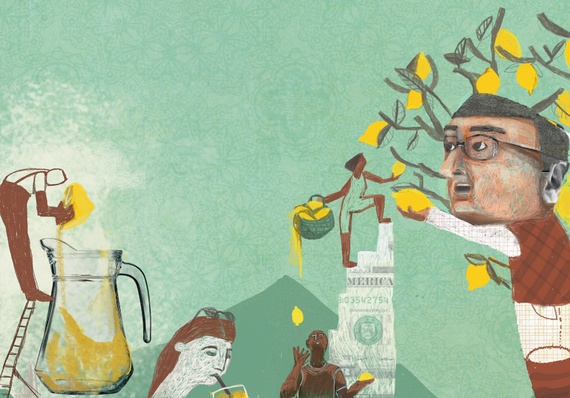As we're nearing the holidays, a time when people have their end-of-the-year charitable contributions more frequently on their minds, I would like to spotlight someone who has made the act of giving a priority on her agenda 365 days/yr.
Suzanne DiBianca is Chief Philanthropy Officer at Salesforce and Co-Founder of Salesforce.org (Salesforce's nonprofit foundation), where she has been busy building a movement around corporate giving since Day 1. With the help of Marc Benioff, Salesforce's charismatic and popular CEO, the company has been one of the pioneers of embedding social engagement within corporations through their 1-1-1 policy (every organization should be giving 1% of their profit, 1% of the time of their employees and/or 1% of their product). Suzanne's efforts through the 1-1-1 model have successfully driven "$115 million in grants, 1.3 million employee volunteer hours and technology to 28,000 nonprofits and education institutions."
Embedding social good within organizations is no longer an option. The new generation is asking for purpose and the corporate world is starting to understand and answer this need. For now, I think we can all be thankful to Suzanne for setting the bar high !
How did the 1-1-1 pledge come about?
Philanthropy has been core to Salesforce from the very beginning. More than 17 years ago, Salesforce set out to create a new technology model with the cloud, a new business model (with the subscription model) and a new philanthropy model with the 1-1-1 model. That means one per cent of our company's product, one per cent of our founding equity and one per cent of employee time is donated to improve communities around the world.
Salesforce.org started right when the company launched. Why was it important to start this so early?
Salesforce.org has given away more than $128 million in grants, 1.6 million hours of community services and provided product donations for more than 29,000 nonprofits and higher education institutions. Building philanthropy into our identity as a company from an early stage has been essential to that success. Today, other companies can take this same approach through Pledge 1%, a corporate philanthropy movement dedicated to inspiring early-stage corporate philanthropy.
How has the 1-1-1 pledge inspired other companies to design similar models that deliver social impact?
We're very proud to have pioneered the 1-1-1 model, and is wonderful to see so many entrepreneurs and companies adopting it through various commitments. Pledge 1% was formally launched about a year and a half ago and since that time, more than 1200 companies have joined the movement, including Twilio, Atlassian and Glassdoor.
Can you give me an example of a favorite client of Salesforce.org? What do they do? How did they use the platform? What was the impact they made?
One of my favorite stories is from the Surfrider Foundation. It is dedicated to protect and preserve the world's oceans, waves and beaches. The foundation's SmartFin project turns a surfboard fin into a sensor that measures multiple metrics including salinity, pH, temperature and wave characteristics, among others, in rough surf that has historically been difficult to measure. The data collected - which is turned into real time charts and dashboards through Salesforce - helps the global science community better understand how climate change is affecting our oceans. The Internet of Things meets the ocean.
What is the greatest lesson you've learned as a leader in the philanthropic space?
I've learned so much over the last several years! Integrated philanthropy essentially means aligning your community support with your core business and competencies. It can take time for things to happen, but I've learned that every company can give back in some way. Companies need to remember that their technology, their products, and their time are just as valuable as the dollars they can give away. Companies can commit to an organization and truly have an impact in the long run.
Finally, do you think by doing good, you're more successful?
Absolutely - it feels great to do good, but it's also solid business sense. For example, today's top talent wants to work for a company that gives back. Earlier this year, a report from PricewaterhouseCoopers found that 59 percent of millennials surveyed have or will deliberately seek out employers whose corporate responsibility reflects their values. To remain competitive, businesses need to bake in a philanthropic approach from the beginning.

